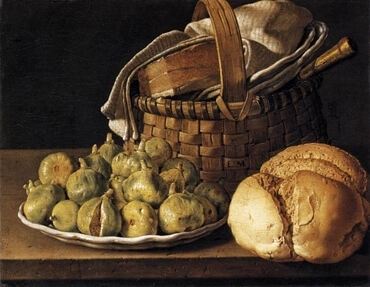Fig

In the Bible, a fig tree represents the "natural", outward life of a person in the world, and the thoughts and feelings directly connected it. Our natural selves have a tendency to be drawn toward evil, seduced by bodily pleasures and engaged in merely factual thinking. If our natural level is connected to a more elevated interior state, though, it can be engaged in doing the work of being good and gathering the knowledge that can be built up into truth. This "natural good" is represented by the figs themselves, the fruit borne by the tree. It's interesting how there is a hierarchy among the most common fruits in the Bible. Olives represent the most exalted human state, which is called "celestial" and is driven by love of the Lord. Grapes represent the next level, which is called "spiritual" and is led by truth from the Lord and love of the neighbor. Figs represent the lowest level, the natural. This makes sense if you think about it. Olives produce olive oil, which is not only food but can also be burned, and fire represents love. Grapes produce wine, which was prized in ancient times and which represents spiritual truth. Figs are food, giving the body energy to work.
Arcana Coelestia # 2712
2712. 'He dwelt in the wilderness of Paran' means the life of the spiritual man as regards good. This is clear from the meaning of 'dwelling' as being used in reference to good residing in truth, which is spiritual good, that is, good present with the spiritual man. The essential nature of that good is described by his dwelling in the wilderness of Paran, dealt with immediately below. That 'dwelling' is used in reference to good residing in truth, or to the affection for truth, is clear from many places in the Word where it is said of cities, which mean truths, that they will be without any inhabitant, by whom good is meant, 2268, 2449, 2451; for truths are inhabited by good, and truths devoid of good are like a city that has no one dwelling in it, as in Zephaniah,
I have laid their streets waste, so that none passes through; their cities are desolate, so that there is no one dwelling in them. Zephaniah 3:6.
[2] In Jeremiah,
Jehovah was leading us through the wilderness. No man passed through in that [land], and no one dwelt there. They have turned his land into a solitary place, his cities have been burned, so that none is dwelling there. Jeremiah 2:6, 15.
In the same prophet,
Every city has been forsaken, with no one dwelling in them. Jeremiah 4:29.
In the same prophet,
In the streets of Jerusalem that are desolate there is no human being, no inhabitant, no beast. Jeremiah 33:10.
'Streets' stands for truths, 2336, 'no human being' for no celestial good, 'no inhabitant' for no spiritual good, 'no beast' for no natural good. In the same prophet,
The cities of Moab will become a desolation, with no one dwelling in them. Jeremiah 48:9.
[3] With each particular expression in the Prophets there exists the marriage of truth and good. Consequently when 'a city' is said to be desolate, the phrase 'no one dwelling in it' is also added, the reason being that 'a city' means truths and 'one dwelling in it' good. Otherwise it would be superfluous to say 'no one dwelling in it' when it has been stated that the city is desolate. In a similar way certain terms occur consistently to mean things that belong to celestial good, others that belong to spiritual good, and others also that belong to truths, as in Isaiah,
Your seed will possess the nations, and they will dwell in the desolate cities. Isaiah 54:3
Here 'possessing' has reference to celestial good, 'dwelling in' to spiritual good. In the same prophet,
My chosen ones will possess it, and My servants will dwell there. Isaiah 65:9.
Here the meaning is similar.
[4] In David,
God will save Zion and will build the cities of Judah; and they will dwell there and possess it, and the seed of His servants will inherit it, and those loving His name will dwell in it. Psalms 69:35-36.
'Dwelling there' and at the same time 'possessing' has reference to celestial good, 'dwelling in' to spiritual good. In Isaiah,
He who says to Jerusalem, You will be dwelt in; and to the cities of Judah, You will be built. Isaiah 44:26.
Here 'dwelling in' has reference to the good of the spiritual Church, which is Jerusalem. To such an extent do the terms used in the Word have reference to their own goods and their own truths that simply from a knowledge of that usage of terms one may recognize what the subject is in general that is being dealt with.






